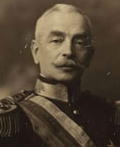 |
António Óscar de Fragoso Carmona
b. 24 Nov 1869, Lisbon
d. 18 Apr 1951, Lisbon |
| Title: |
Presidente do Ministério (President of the Ministry) |
| Term: |
9 Jul 1926 - 18 Apr 1928 |
| Chronology: |
9 Jul 1926, appointed, decree of the Government of the Portuguese Republic [1] |
| |
9 Jul 1926,
functions of Head of State (Presidente da República) devolved on the ministers acting collectively according to the Constitution of 1911, Art. 38, § 3.° |
| |
26 Nov 1926, President of the Ministry is authorised to exercise the functions of President of the Republic, decree of the Government of the Republic [2] |
| |
18 Apr 1928, successor appointed, decree of President of the Republic [3] |
| Names/titles: |
Presidente interino da República Portuguesa (Interim President of the Portuguese Republic) [29 Nov 1926 - 15 Apr 1928]; Presidente da República (President of the Republic) [15 Apr 1928 - 18 Apr 1951] [see details] |
| Biography: |
| Born in the family of a military officer, who attained the rank of general; received primary education at Chaves; entered military college, graduating in 1888; attended a polytechnic school at Lisbon (1888-1890); educated at the Escola do Exército (Army Academy), completing course of the cavalry branch (1892); attended equestrian school at Vila Viçosa; pursued military career, successfully progressing in ranks: oficial (1893), alferes (1894), lieutenant (1899), captain (1907), major (1913), lieutenant-colonel (1916), colonel (1919), general (1922), marshal (1947); served on the committee for reorganization of the Army (1910); instructor at the Central School of Officers (1913-1914); assumed command of cavalry school at Torres Novas (1918-1922); appointed commander of the Fourth Military District (1922-1925); briefly served as war minister (15 Nov 1923 - 18 Dec 1923) in the Cabinet of António Ginestal Machado; took part in the conspiracy of May 1926, which succeeded in overthrowing the government of Bernardino Machado; managed to oust general Armando Gama Ochoa and took his place in informal military triumvirate (3 Jun 1926), which ruled Portugal after the coup; served as minister of foreign affairs (3 Jun 1926 - 6 Jul 1926); relieved of his ministerial post after a split with Gomes da Costa; led successful military coup (8 Jul 1926 - 9 Jul 1926); appointed President of the Ministry (9 Jul 1926 - 15 Apr 1928) and war minister (9 Jul 1926 - 29 Nov 1926); assumed the functions of Head of State (29 Nov 1926) in accordance with a governmental decree; elected President of the Republic by popular vote (1928); secured the passing of the Constitution of 1933, declaring Portugal a "unitary, corporatist republic"; was gradually superseded as a holder of real political power by António de Oliveira Salazar, who maintained the authoritarian regime of Estado Novo (1933-1974); re-elected by popular vote in 1935, 1942, and 1949; died in office. Biography source: [4] |
| |
| [1] |
Diário do Govêrno, Sexta-feira 9 de Julho de 1926, I Série, Número 147, Suplemento, Decreto n.° 11:866. |
| [2] |
Diário do Govêrno, Segunda-feira 29 de Novembro de 1926, I Série, Número 267, Decreto n.° 12:740. |
| [3] |
The decree confirming the discharge of Carmona of the duties of Presidente do Ministério was apparently not issued (see Os presidentes e os governos da república..., op. cit.) |
| [4] |
"Os Presidentes da República Portuguesa", coord. by António Costa Pinto and Maria Inácia Rezola (Lisboa: Temas & Debates, 2001) |

